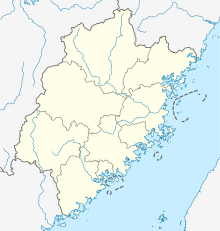Jinjiang, Fujian
|
Jinjiang 晋江市 |
|
|---|---|
| County-level city | |

Jinjiang's Lüzhou (Green Island) Park, with a monument bearing inscription "诚信、谦恭、团结、拼搏" (Integrity, humility, unity, hard work)
|
|
| Location in Fujian | |
| Coordinates: 24°49′12″N 118°34′12″E / 24.82000°N 118.57000°ECoordinates: 24°49′12″N 118°34′12″E / 24.82000°N 118.57000°E | |
| Country |
|
| Province | Fujian |
| Prefecture-level city | Quanzhou |
| City seat | Luoshan Subdistrict (罗山街道) |
| Area | |
| • Total | 721.7 km2 (278.6 sq mi) |
| Population (2010) | |
| • Total | 1,986,447 |
| • Density | 2,800/km2 (7,100/sq mi) |
| Time zone | China Standard (UTC+8) |
| Postal code | 362200 |
| Area code(s) | 0595 |
| Website | www.JinJiang.gov.cn |
Jinjiang (simplified Chinese: 晋江; traditional Chinese: 晉江; pinyin: Jìnjiāng; Pe̍h-ōe-jī: Chìn-kang) is a county-level city of Quanzhou City, Fujian Province, China. It is located in the southeastern part of the province, on the right or south bank of the Jin River, across from Quanzhou's urban district of Fengze. Jinjiang also borders the Taiwan Strait of the East China Sea to the south, and Quanzhou's other county-cities of Shishi and Nan'an to the east and west, respectively. It has an area of 721.7 square kilometres (278.6 sq mi) and a population of 1,986,447 as of 2010.
Jinjiang has six subdistricts and 13 towns:
Anhai Town Government
Jin River waterfront
Jinjiang is known for the large number of factories which operate there, especially in the clothing and name-brand footwear industry. Many migrant laborers come from elsewhere in Fujian and even from outside the province to commit themselves to year-long contracts.
Jinjiang is famous as home to many Chinese in diaspora, especially in Taiwan, Philippines, Malaysia, Singapore, Myanmar, Australia, etc. Once poor and overpopulated in early 19th century, Many locals moved to Southeast Asia for better lives, as what they called "xia nan yang, 下南洋", literally as "to sail down to the south sea" in English. Many of them have been successfully integrated into local societies and achieved great success. For example, according to Forbes, 6 out of 10 richest business tycoons in Philippines can trace their ancestry back to Jinjiang. Therefore, from 80s to 90s, Jinjiang received much donation and investment from overseas Chinese communities.
...
Wikipedia

